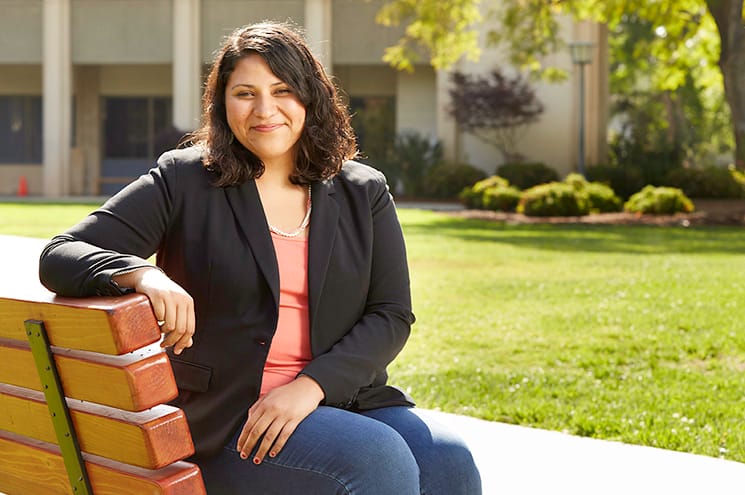Beyond Borders: Gloria Montiel’s Doctoral Degree Marks a Milestone for Immigrant Students

Most undocumented immigrants who are accepted to a college or university will not graduate.
Try telling that to Gloria Montiel. The School of Educational Studies (SES) alumna paid little attention to the odds as she tackled risks, overcame obstacles, and took advantage of opportunities to become Claremont Graduate University’s first undocumented student to graduate with a doctoral degree last spring.
“I had always focused on my academic achievement, and that was a priority for me,” Montiel said. “The whole immigration stuff—I would deal with that later. I would find a way.”
She did. The new alumna now stands as one of only a handful of undocumented students in the United States to complete a PhD. She credits a childhood that valued academic excellence, CGU resources, and support from fellow students who share her undocumented background and chronicled each other’s experiences on social media.
But being a trailblazer is nothing new to Montiel. Her first involved Harvard.
Educational Journey
Born in the Mexican state of Guerrero, Montiel came to the United States with her parents when she was two years old, though the family returned to Mexico two years later. Seeking opportunities, the Montiels moved to Orange County when Gloria was eight. The idea of going to Harvard entered her mind in sixth grade.
While the Supreme Court had ruled in 1982 that it was unconstitutional to deny undocumented immigrants access to K–12 public education, Montiel would run into challenges other undocumented young people considering college face: lack of access to federal loans, grants, and in-state tuition; obstacles to securing a job; the threat of deportation; and ignorance. Once, a friend—as a joke—told Montiel, “Don’t you know Mexican girls don’t go to Harvard?”
The joke wasn’t funny. And her friend was wrong.
With a financial aid package from Harvard and scholarship from a nonprofit, Montiel earned a bachelor’s degree in American literature, a master’s degree in learning and teaching, and a teaching credential. She was the first undocumented student to graduate from the Ivy League institution’s Graduate School of Education in 2011.
Montiel returned home and began working as a grant writer for a nonprofit providing health, education, and other programs. She launched a STEM (science, technology, engineering, and mathematics) program for children, among other projects. Montiel saw her passion for education and community merging.
“My own educational journey wasn’t over,” she said.
#UndocuPhD
Montiel said she became aware of CGU through SES Professor William Pérez, one of the country’s leading experts on undocumented students in higher education. Montiel had read his research and articles, and Pérez had given a talk at Harvard.
Through Pérez’s influence, Montiel was awarded the 21st Century Civil Rights Graduate Fellowship, which was established to support undocumented students interested in pursuing doctoral studies in education at CGU.
Montiel soon befriended fellow students such as Jessica Valenzuela, who graduated with a master’s degree in education in May; Iliana Pérez, who earned a master’s degree in economics in 2015; and Nancy Guarneros, who received a master’s degree in education from UCLA before coming to CGU. Pérez and Valenzuela are expected to graduate with PhDs in education in May 2018; Guarneros—no longer undocumented—later this summer.
Because of their shared background, they considered themselves a “cohort” of sorts, recording their academic journey on Twitter and Instagram using the hashtag #UndocuPhD.
“We encourage each other not only in the academic sense, but also in the personal sense,” Valenzuela said. “When one of us is feeling more jaded than the others, we help one another carry that weight.”
Top One Percent
At CGU, Montiel became a beneficiary of Deferred Action for Childhood Arrivals (DACA), an Obama administration initiative established to protect eligible young undocumented immigrants who entered the country as minors from deportation. Though not a path to citizenship, it has provided a two-year renewable reprieve from deportation and eligibility for work authorization to more than 750,000 young adults.
But that reprieve was endangered last year.
One of President Donald Trump’s campaign promises was to end DACA. News of U.S. immigration authorities arresting undocumented immigrants in high-profile raids across the country prompted anxiety and advocacy. Trump reversed his campaign promise in April—but fear and uncertainty remained.
But Montiel remained steadfast, remaining “undocumented, unafraid, unapologetic.” Her experiences captured the attention of NBC LA, Telemundo, Univision, and other media outlets.
“Among all the students I have supervised, advised, and mentored as a faculty member over the past 15 years, Gloria is in the top one percent,” Professor Pérez said.
Pérez proved to be instrumental to Montiel’s success.
Trailblazing Research
“Professor Pérez really helped us understand the world of academics,” Montiel said. “He mentored us not only through the coursework, but also the research part, how to make our work known, and how to present our work at conferences. These were important to us as well.”
Her dissertation focused on the effects of an undocumented status on the identity and college experience of undocumented Latino students attending highly selective private colleges, drawing on her interviews with more than 40 individuals across 19 private liberal arts colleges and research universities.
Professor Pérez described Montiel’s work as trailblazing, given the need for empirical research to inform immigration and educational policies.
“Gloria’s success highlights the need for universities to build institutional capacity to recruit undocumented students into graduate degree programs and provide the necessary support for them to thrive,” he said.